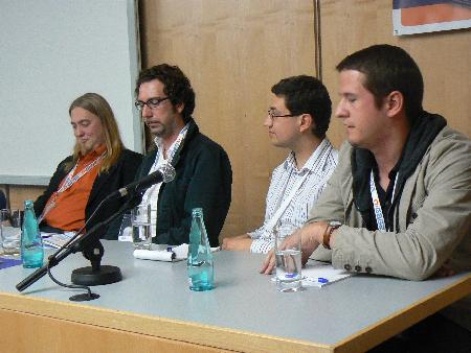The first session we're reporting on is the panel session on 'Mobile Games: Outside The Box'. "We're not totally clear what the title means," says chairman Frank van Oirschot from Ex Machina. "So we're going to improvise."
The panel consists of Christopher Kassulke from HandyGames, Robert Boehm from Exit Games, Matthias Hellmund from Exozet Games, and Benjamin Zuckerer from CipSoft, along with van Oirschot.
He kicks off, talking about an Ex Machina project in the 'TV Play Along' area, where you play games while watching a TV show, with the two being synchronised in some way. The project was for Dutch radio station Radio 538.
"The consumer can play with his mobile or on the internet, answering the questions that the DJ is asking you," says van Oirschot. "Whoever answers best after three to five minutes is the winner of that show."
It's called Weten Is Winnen, and apparently has been designed to run on as many phones as possible it's a mass-market project, as you'd expect from the radio link.
Ex Machina is an intriguing counterpart to what UK firm Connect 2 Media (which just merged with Hands-On Mobile's EMEA operation) both companies are looking to broadcast media as a source of innovation for mobile games.

Over to Kassulke, who says HandyGames has been running play-for-fun betting games where people bet on Bundesliga matches against their friends for virtual money for some years now, and has launched a cross-platform trading card game.
"We are also looking at connecting to TV, but does it make money?" he says. "TV and radio might push this like hell, but at the end of the day it doesn't make a lot of money. And we do need to make money!"
Building the cross-platform dream
Boehm agrees that connecting TV and mobiles is one opportunity, but says Exit Games is more focused on cross-platform games for its clients like Vivendi and Konami.
"The wole industry is searching for new business models, new opportunities, new types of games and communities to leverage their brands," he says. "It would be stupid if you have a brand on mobile not to leverage it on other platforms as well."
Boehm thinks creating cross-platform communities around games is an exciting prospect, citing one of the company's clients who's creating a browser-based golf game. In short, he's not so excited about combining mobile games and TV, but is enthusiastic about the potential for integrating mobile with social network and browser based games.
Hellmund says Exozet looks at cross-platform stuff more from a game designer's viewpoint, being able to share assets between, say, mobile and DS. He'd also like to do more connected games that span different platforms, with a single community, but cites his firm's Catan game as an example of the challenges this will face.
"But there are very hard restrictions from a platform provider's perspective," he says. "You can't connect a Nintendo DS Catan player with a mobile Catan player for multiplayer at the moment, due to licensing restrictions. We'd love to have an Xbox Live Arcade player against a DS player against a mobile player, but at the moment it's just not possible."
Going beyond mobile
Now Zuckerer chimes in, and says CipSoft sees non-mobile platforms as a way to get more people playing your game. "Each time you make a new client for a new device type, like a version that runs in an internet browser, you potentially gain new customers for your game, and you offer players of the game a way to play the game as they choose it."
So for CipSoft, cross-platform gaming is about offering more choice to existing players the company is working on a browser-based version of its TibiaME massively multiplayer online game but also sees it as a way to attract new players.
The browser version of TibiaME will be richer than the mobile client, says Zuckerer, with richer graphics and a slicker interface.
Are any of the panellists working on other console versions of their mobile games? They all shake their heads and say no. "To do native stuff is quite tricky, and then there are the licensing restrictions," says Boehm. "It's maybe a little bit too early for that."
I think he's talking about connected games at this point though plenty of mobile developers are looking to make games for DS and Xbox Live Arcade, but they tend to be standalone versions, rather than being connected in any way back to the mobile versions.
Boehm says he's inspired by the games being launched by UK firm Playfish on Facebook, although he admits that the question is how to make money from these kinds of games. As a middleware provider, Exit Games' platform could "easily" integrate with sites like Facebook if required by clients.
Kassulke is pragmatic. "In mobile, there is a customer that pays. In online, everything is free, and it's hard to change that. But you can make a brand out of nothing, which is interesting. I know Kristian [Segerstrale, from Playfish] and he is not very happy with the revenues."
Are TV firms moving more into mobile games? Zuckerer says it's happening in Latin America, although it's too early to gauge how successful they're being. However, he has views on what the industry needs here.
"We need more original IP and games that are more creative," he says. "At the moment, we have a lot of brands, and a lot of familiar games like Tetris. But it's important to try and innovate and make something new, not copy something which is existing already."
There's an interesting theme (kinda) bubbling under here which is that advertising mobile games on TV has always been prohibitively expensive, which is why only Jamba has really invested significantly in it.
But if TV firms start seeing a way for mobile games to become part of the formats of TV shows, there may be an opportunity for mobile firms to make games to target the huge TV audience without having to sell their grannies to pay for 30-second ad spots. Possibly.
Kassulke gets back to gameplay. "We need some innovative games. We are developing some motion sensor games, and some other types of games that are really dedicated to the mobile. But we have to make money, so if we are building in connected elements, somebody has to pay, whether it's an advertiser or the players or somebody else."
iPhone multiplayer gaming
First mention of the iPhone now: how can mobile firms benefit from the success of the iPhone and its App Store? Boehm says it's easy for Exit Games it's ported its SDKs to the iPhone so developers can make connected games for it.
"We have just signed a deal with a top-tier mobile publisher which has one of the top ten games in the Apple App Store, and they'll work with our platform to make a multiplayer game," he says.
Well, that's presumably Vivendi or Sega then excuse me for starting the MULTIPLAYER SUPER MONKEY BALL FOR IPHONE rumour here. Or Crash Bandicoot Nitro Kart 3D, of course the latter may make more sense as a connected multiplayer iPhone game.
Kassulke points out that there's downward pressure on games pricing in the App Store, due to the increasing number of free games. Meanwhile, Zuckerer is chuffed with the iPhone because it's pushing data tariffs operators selling it tend to be offering unlimited data.
Will iPhone gamers be different from mobile gamers? Kassulke thinks they won't pay a lot for their games. Hellmund says it'll be interesting to see Apple's product strategy for example, if it launches an iPhone nano to target a broader range of users.
Peter Ahnegard from Sony Ericsson is in the audience, and he chips in at this point. "It's good for the market that they're trying to raise the bar. It puts pressure on us and Nokia and Motorola to improve the experience for consumers. Of course, Apple has an advantage because they have only one phone."
Would Sony Ericsson shift towards that kind of model then? "That's pushing it a little bit!" he laughs.






















